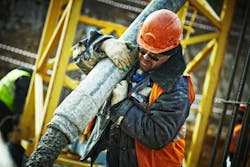Modular construction gets boost from impacts of the pandemic
By Peter Fabris, Contributing Editor
The impact of the Covid pandemic on the construction industry appears to be fueling demand for modular construction methods, especially in the western U.S. and Canada.
Several new suppliers of modular units have come online since 2019, and existing companies have been scaling up factory capacity. Modular offers benefits that can counteract challenges that were worsened by the pandemic.
For instance, bringing the task of ordering finishes, fixtures, and construction materials under one roof streamlines the supply chain, which grew tighter and became less predictable after the pandemic struck. Modular vendors that supply finished bathrooms and kitchens remove the burden of procuring many individual products from contractors and subcontractors.
Likewise, by completing the work of multiple subcontractors up front, they relieve the pressure on contractors to hire and schedule some of the work of various trades on site, thereby easing demand for labor.
Modular construction can also speed up construction schedules. There are some drawbacks, though, including the high cost of shipping.
Developers today use modular construction for many kinds of buildings, including supportive housing, hotels, resorts, apartments, detached homes, senior living facilities, office buildings, and factories.
